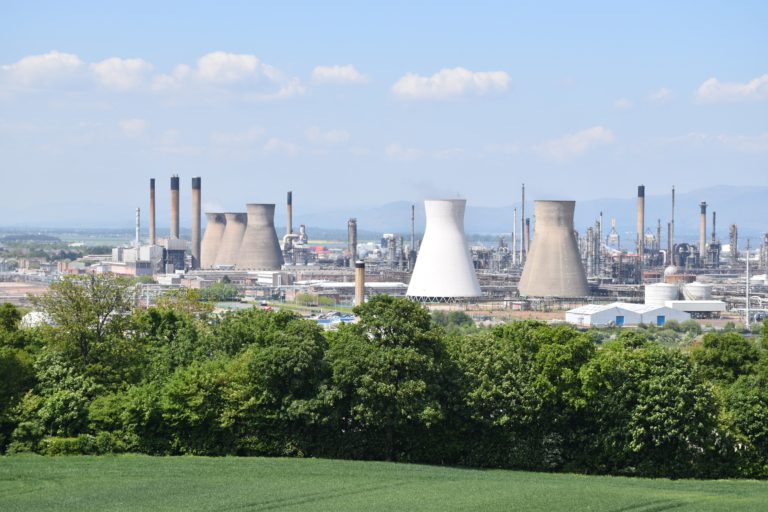
Last November, Petroineos outlined plans to transform the refinery site into a finished fuels import terminal and distribution hub which will require significantly fewer people to operate. As a result, Petroineos will, this month, enter a formal consultation process with the site’s 475 employees and their representatives on the details of the transformation plan, which is expected to lead to a net reduction of approximately 400 roles over the next two years.
Energy transition impacting fuel demand
Grangemouth is the UK’s oldest refinery and currently faces significant challenges due to global market pressures and the energy transition. Refining is a globally competitive industry and Grangemouth is increasingly unable to compete with bigger, more modern and efficient sites in the Middle East, Asia and Africa.
Due to its size and configuration, Grangemouth incurs high levels of capital expenditure each year just to maintain its licence to operate. This annual outlay on essential planned maintenance and running repairs has been consistently higher than the company’s earnings over the past decade.
Petroineos is a joint venture between INEOS and PetroChina and those shareholders have invested more than $1.2bn since 2011 to maintain the refinery’s safe operation, recording losses in excess of $775m during the same period.
Frank Demay, Chief Executive Officer at Petroineos Refining, said: “The energy transition is happening now and it is happening here. Demand for key fuels we produce at Grangemouth has already started to decline and, with a ban on new petrol and diesel cars due to come into force within the next decade, we foresee that the market for those fuels will shrink further. That reality, aligned with the cost of maintaining a refinery built half a century ago, means we are exploring ways to adapt our business.
“The action we are taking to create an import terminal will safeguard fuel supply for Scotland. We currently expect Grangemouth to be ready to operate as a national distribution hub for finished fuels in Q2 next year.
“Unfortunately, a terminal would require only around one-fifth of the current refinery workforce. Therefore, we will soon enter an information and consultation process with representatives of our employees to discuss the proposals. We have already agreed to move from the UK statutory minimum redundancy terms to an 18-month package and, if plans proceed, we intend to do everything we can to reduce the impact on our people. We will of course be seeking to minimise compulsory redundancies as far as possible.”
Pivot to low carbon
While preparing the refinery site for the transition to an import terminal, Petroineos is simultaneously working with UK and Scottish governments to analyse options for Grangemouth to become a low-carbon fuels manufacturing hub. An initial feasibility study, known as ‘Project Willow’, is assessing various low-carbon opportunities from technical, economic, commercial, regulatory, environment, community and skills perspectives.
Project Willow, funded equally by the Scottish Government and UK Government, is being managed by global consultancy firm EY, with technical, engineering and commercial support provided by Petroineos, INEOS and PetroChina. The initial research phase is complete, with shortlisted options for development including, but not limited to, Sustainable Aviation Fuel (SAF), low-carbon hydrogen and related products, and eFuels. The project team has entered the second phase of research, comprising a detailed assessment of the viability of each shortlisted option.
By Spring 2025, the project aims to have identified commercially viable opportunities to develop low-carbon fuels that would underpin government commitments to net zero transition, maximise local employment, and contribute to long-term sustainable energy and fuel security in Scotland and the UK.
Grangemouth complex
There are three different businesses employing around 2,000 people in total at the Grangemouth site, which spans 1,700 acres and is Scotland’s largest industrial complex:
- The oil refinery: operated by Petroineos, a 50/50 joint venture between PetroChina and INEOS, employing c.475 people.
- The petrochemicals plant: an INEOS business employing c.1,000 people, with 1.4m tonne production capacity for products including ethylene, ethanol, polyethylene, polypropylene.
- The Forties Pipeline System: another INEOS business which employs c.500 people, transporting 300,000 barrels of crude oil per day from 85 North Sea fields. The pipeline also facilitates approx. 30% of the UK natural gas supply.
The wider Grangemouth complex also hosts some 2,000-5,000 contractors each day, working on a range of projects
Business as usual for INEOS
Following today’s announcement from Petroineos regarding the cessation of refining operations at Grangemouth, INEOS moved quickly to issue reassurances regarding the two other businesses located on the wider Grangemouth complex, in a statement that confirmed:
“INEOS O&P UK and INEOS FPS (Forties Pipeline System), will continue as normal delivering high quality services and products to our customers and are largely unaffected by this change. We wish to assure our customers, suppliers and other stakeholders that it is “business as usual” for the INEOS businesses at Grangemouth.
“INEOS Grangemouth remains committed to a long term successful future for the site which includes the commitment to deliver net zero by 2045.”
Fuels Industry UK responds
Following the announcement, Elizabeth de Jong, Chief Executive Officer of Fuels Industry UK has said: “We are very sad to hear that Grangemouth refinery is planning to become a fuels’ import terminal.
“As we have told Government, the fuels sector is vital for the nation’s energy security and net zero ambitions, but faces difficult investment conditions in the UK, as this decision shows. Today’s announcement must be a wake-up call for Government to work more closely with us and our member companies to address the long-term challenges facing the sector.”
Fears for Grangemouth future
June Wyper, a Grangemouth resident with family and friends who have worked, and still work, at INEOS, in Grangemouth, spoke with Fuel Oil News to share her intense disappointment with the decision and her fears for the area.
“With the loss of 400 jobs, I do not take any comfort that two of the INEOS businesses are unaffected. This will have a detrimental effect on families involved, local businesses and the town of Grangemouth.”
Echoing concerns over the need to address investment in the industry, June continued: “I believe the responsibility lies with Jim Ratcliffe and the Scottish Government who could have invested in Grangemouth Refinery over a period of 5 years therefore saving jobs and the future of Scotland’s refinery. I believe the UK Government could have intervened.
“As a wife, mother and grandmother I am nervous for the future of Grangemouth; INEOS is a major employer in the area. Grangemouth used to be a thriving town but, like other towns, has seen such a detrimental effect on shops, living standards, jobs and local services brought on by austerity and the cost-of-living crisis. Community services have taken a big hit, with more cuts to come, and I fear for the future of our young people as there is nothing to keep them in Grangemouth.
“The town will suffer with the closure of the Grangemouth Refinery. This will hurt the local economy badly, flat rentals, local hotels, local shops etc which the workforce of INEOS all contribute to.”
Fight for jobs
UK union, Unite, which represents 500 workers at the site, has vowed to explore all avenues to preserve high quality jobs at Grangemouth in the light of the plans to close the refinery. The union says the closure places the jobs of those employed directly at Grangemouth in jeopardy, but could also impact thousands more in the supply chain.
Highlighting “widespread fury within the workplace due to the failure of the bosses and politicians to ensure the future of the site”, Unite general secretary Sharon Graham said: “This is an act of industrial vandalism, pure and simple.
“This dedicated workforce has been let down by PetroIneos and by the politicians in Westminster and Holyrood who have failed to guarantee production until alternative jobs are in place.
“The road to net zero cannot be paid for with workers’ jobs” – Sharon Graham, Unite
“This is now the last chance for this Labour government to show whether it’s really on the side of workers and communities. The road to net zero cannot be paid for with workers’ jobs. The government must put its money where its mouth is to ensure the jobs are safeguarded. This is the only refinery left in Scotland and it must remain. There are alternative plans.
“This is yet another example of workers paying for a crisis they did not create while billionaire owners laugh all the way to the bank “
Alternative futures
Unite is now in high level talks with the government about alternatives for the site, including the production of sustainable aviation fuel.
Derek Thomson, Unite Scottish Secretary said: “The sole objective for Unite remains that the jobs at the refinery, and thousands more in the supply chain, are protected by any means.
“Unite does not accept that the future of the refinery should have been left to the whim and avarice of shareholders. The complex is critical to the nation’s manufacturing base and energy security. The governments involved cannot simply hide behind the convenient smokescreen that this is a commercial decision which they couldn’t influence.”
Image credit: Petroineos
